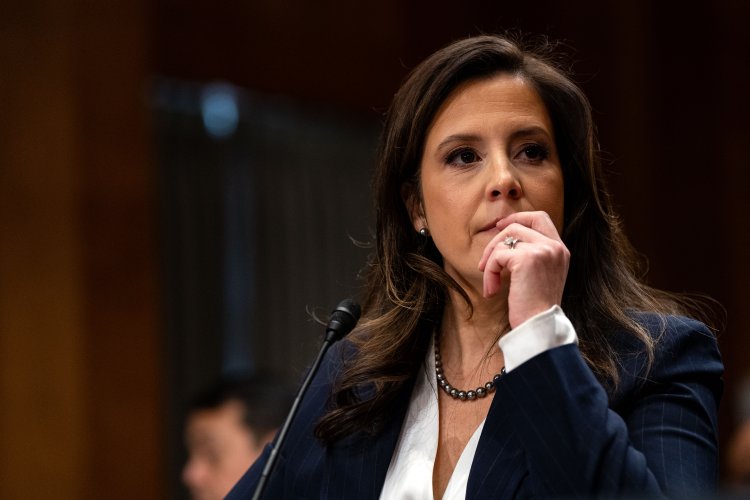The competition for UN ambassador heats up, though certain prospects have already declined
Despite Trump's apparent disregard for the world body, the ambassadorship is probably too significant a role to remain vacant.

Several prominent potential candidates, however, have opted out of the race.
Currently, top contenders include David Friedman, Trump’s first-term ambassador to Israel, and Ellie Cohanim, who served as deputy special envoy focused on combating antisemitism during Trump’s first term, according to a Republican involved in the discussions.
Another possible candidate is GOP Sen. Bill Hagerty of Tennessee, who was Trump’s first-term ambassador to Japan. However, the narrow Republican margins in Congress could hinder his chances, particularly since not all Republican senators are guaranteed to support the president. Trump previously withdrew Stefanik’s nomination due to rising GOP concerns over maintaining the House majority, and she will continue to represent her New York district while returning to a leadership role in the House.
Hagerty’s office did not respond to a request for comment.
Richard Grenell, who served as a special envoy for Trump and has experience at the U.N., stated on Newsmax Thursday night that he’s a “hard no” on the U.N. ambassador role. Morgan Ortagus, a former State Department spokesperson who currently deals with Middle East issues for Trump, is another name being discussed, but a source familiar with her situation indicated that she is also not interested.
A White House spokesperson declined to comment.
The Trump administration has typically been critical of the United Nations, having withdrawn from several multilateral institutions like the World Health Organization. The tensions with the U.N. stem from Trump’s general suspicion of global institutions that he feels may undermine U.S. sovereignty, along with dissatisfaction regarding how certain U.N. member states have treated Israel.
Nonetheless, the ambassadorship to the U.N. is a prominent position that offers an important platform. Leaving it vacant could weaken America’s standing at a global institution that various countries rely on for financial assistance and to voice concerns.
Currently, the U.S. has acting representatives at its U.N. mission in New York, with the authority to cast vetoes at U.N. Security Council meetings. However, a Senate-confirmed appointee with Trump’s support would add more weight to the role.
“As noisome and ineffectual as the U.N. is, it remains an important forum for the United States to make its positions clear,” noted a former State Department appointee during Trump’s first term. “The administration needs someone committed to its agenda there to do it rather than leaving it to career placeholders who may not be completely onboard with President Trump’s America First vision.” The individual spoke on the condition of anonymity as they were not authorized to represent the administration.
The decision to withdraw Stefanik’s nomination took many by surprise, including some of her staff who intended to follow her to the State Department. This development also represented a setback for a White House that has been proud of its ability to push through nominees without issue.
As a result, White House officials are expected to swiftly identify a replacement for Stefanik, mindful that they have already let the position remain unfilled for two months and must now restart the nomination process, according to two Republicans involved in the discussions who spoke on condition of anonymity.
Among GOP circles, Cohanim has garnered praise for her efforts against antisemitism, an issue that has become increasingly relevant amid Trump’s focus on targeting students and universities for their critiques of Israel’s actions during the war in Gaza.
Cohanim, a Jewish American of Iranian descent, fled Iran during its 1979 Islamist revolution and is a strong supporter of Israel. Appointing her could signal a strong pro-Israel stance and a message against Iran’s regime.
Friedman, a loyal Trump ally, played a pivotal role in shaping Trump’s early Middle East policies, which heavily favored Israel and resulted in the Abraham Accords—a historic diplomatic breakthrough between Israel and several Arab nations.
Trump often gravitates towards trusted associates when seeking candidates to fill vacancies, a tendency that could help Friedman or other close advisors rise in the ranks of U.N. contenders.
The two Republicans involved in the discussions cautioned that the search is just beginning, and it is still uncertain which direction the president will take as advisors and allies propose various candidates.
Grenell, who has held roles such as spokesperson for the U.S. mission at the U.N., ambassador to Germany, and acting director of national intelligence, provided little clarity on his disinterest, stating simply that he has “plenty to do.” He remarked, “President Trump has me doing different things.”
While Grenell is a controversial figure within Trump’s circle, his loyalty has been recognized, and he currently serves as a special envoy for “special missions,” which has recently included overseeing efforts to restore U.S. deportation flights to Venezuela. Trump has also appointed him as acting director of the Kennedy Center for the Performing Arts in Washington.
Grenell did not elaborate further when contacted, instead directing a reporter to his Newsmax interview.
Ortagus works on Middle East matters for another close Trump adviser, special envoy Steve Witkoff. As deputy Middle East envoy, she has been instrumental in managing the U.S. and French-brokered ceasefire between Israel and Hezbollah in Lebanon.
A source familiar with Ortagus’ situation, who requested anonymity due to the sensitive nature of the topic, noted that she enjoys her current role and the behind-the-scenes work it entails.
Even with a swift nomination process by the White House, the chosen candidate may encounter challenges in the Senate.
Democrats are incensed with the Trump administration for its attempts to dismantle significant portions of government, including the U.S. Agency for International Development. Some may seek procedural means to delay or even obstruct the nomination altogether.
Frederick R Cook for TROIB News












